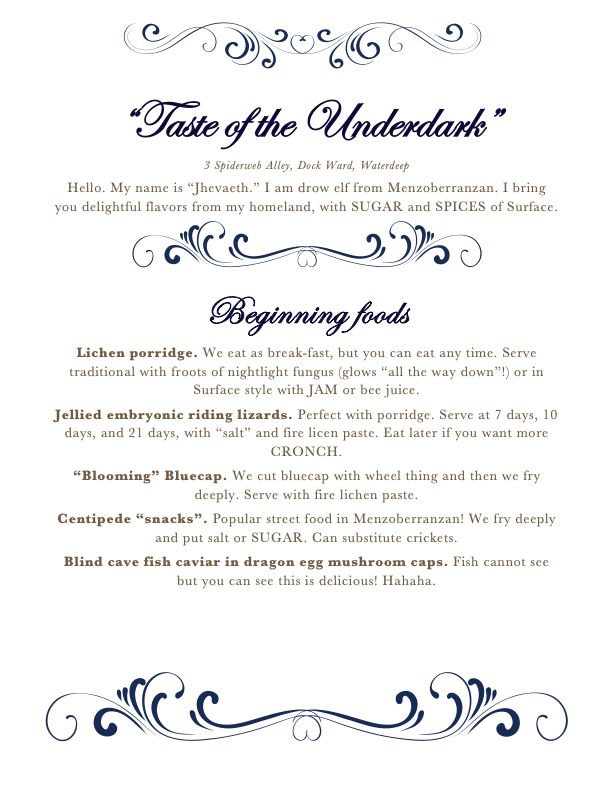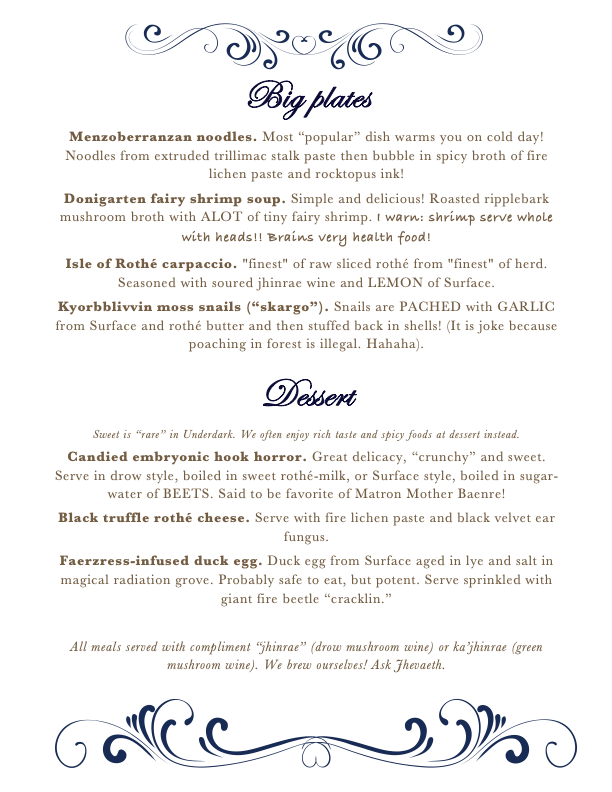This is part thirteen of a multi-part series exploring how I, Lise, see the drow of D&D. For more info, see part 1’s introduction. Also worth reading is the post where this all started: “On making the drow less problematic.”
- Introduction + the banality of evil and social Darwinism
- The law of “don’t get caught”
- The ultimate in “guess” culture
- Chosen ones
- Connoisseurs of sensual pleasures
- Sexual orientation
- Gender identity and trans-ness
- Yes, heat vision
- Drow language
- Consent in the matriarchy
- No one is born knowing their society is fucked
- Drow cuisine
- Etc etc (you are here)
Etc etc
Lots of little things make their way into my drow headcanon, too. These explain some little bits that are never really addressed in canon, or answer questions or complaints about adventures I’ve played or books I’ve read. These include:
There is a “graduate school” in Menzoberranzan that trains paladins, called Orthae Thalack (“holy warfare”). It’s mostly female students, but males can attend with recommendations from the mistresses of Arach-Tinilith (the school at the Academy where priestesses are trained). I made this up as part of my paladin Kzandr’s backstory.
Druids who dedicate themselves as Lolth are as honored as clerics, and are still considered priestesses. Druidry is something you can “major” in at Arach-Tinilith, and there’s a Mistress of Druidry, who serves as a kind of dean for that school, like the other topical mistresses do. (In my drow intrigue game, she’s even part of our house!)
Of course, drow druidry (drowidry?) bears little resemblance to surface druidry, because their ecology is so different. There’s probably a lot of connection to fungus, (un)death, and decay. They take “you cannot kill me in a way that matters” to heart!
In 5e terms, I see them as being Circle of Spores druids. Many harbor a fascination with Zuggtmoy, the demon prince of decay. Because god forbid we forget Lolth lives in the Abyss.
(In fact, my new character in my drow intrigue game is going to be a Spores druid/Fiend warlock of Zuggtmoy!)
While in theory gender is more important than rank in drow society (the lowest female is still better than the highest male), in practice, if you’re a commoner female and you see a noble male walking down the street, you get out of the way.
The merchant and commoner classes lead lives very different than the nobility. Gender divisions matter a lot less, and they have “marriages” that are more like contracts. But we don’t see that as much in the books (nor even my fanfic!), because it’s not as interesting.
How many noble houses are there? 64, because 8×8, because spiders.
Drow fashion includes lots of faerie fire and — for the most elite — live spiders. I’ve called these decorative live spiders “jewel spiders.”
Relatedly, harming a spider is cause for punishment. It’s strange to me that this isn’t canon, and that, in fact, some canon sources have the drow eating spiders. Of course, all the caveats about “don’t get caught” and “the punishment depends on gender” apply here, too.
Addendum to the language post: I can see there being language differences between different cities, like the difference between Drow as spoken in Menzoberranzan Drow and Drow as spoken in Ched Nasad . This makes sense, as each city is an isolated city state, and we know they’re different culturally, too.
You can’t convince me that the villain NPCs in the first part of Out of the Abyss deliver comprehensible instructions to the PC captives in Undercommon. No, they just yell at them in Drow and expect someone else to translate. I imagine that Lolthite drow only speak Undercommon if they’re forced, and probably see it as distasteful. Just knowing Undercommon is probably stigmatized as a sign of low status, since it’s a trade language and why should anyone but a commoner bother with that?
I imagine drow have an unearned sense of exclusionary pride about their language, i.e. they don’t want non-drow to learn it, and don’t believe they’re capable of it. The drow are probably the sort of people who think their language is the “hardest” to learn.
In canon, the drow of Menzoberranzan use the spire Narbondel as their timepiece. But what if you can’t see Narbondel, because you’re an outlaw wizard living outside the city, or you’re in a secret base in the Clawrift? Well, that’s why I invented time-sconces, which are basically mini-Narbondels that double as lamps. They are kept in time with the spire itself manually or magically.
I can’t remember if it’s canon or fanon, but at least in my headcanon, drow nobles use intricate hairstyles to represent their house and their role within it. Retainers have different hairstyles than actual relatives of the Matron, males and females have different hairstyles, and different roles in the house (matron, priestess, weapons master, etc) have different hairstyles.
In this light, Jarlaxle’s choice to shave his head is quite defiant! (I forget if that point is ever made in canon, but it exists in my head, anyway). And so part of the initiation into Bregan D’aerthe is having one’s hair cut. (I stole the last bit from biichan’s fic “the season it revives”).
There’s a whole fan cut of the Generations trilogy in my head which involves a lot more of Jarlaxle and (resurrected) Zaknafein talking through their feelings, and also probably kissing. Honestly, I don’t even care that much about the kissing; I just want emotions and character interiority. In the 1000s DR flashbacks, I want there to be a lot of discussion of their shared trauma, because heck, Zak’s not the only one abused by Malice, and in the 1490s DR resurrection frame story, I want there to be some goddamn guilt and repentance from Jarlaxle for being the one who sold his boyfriend into that situation, especially because in the intervening years he did a similar thing to Artemis Entreri, another boyfriend.
Parting Thoughts
Well, that was a lot. If you’re still here, thank you for reading
At the end of thirteen parts, I hope that one thing is clear — I’ve built a drow society/culture in my head that fleshes them out far beyond what canon has done. In some sense I don’t love the drow — I love what I’ve made of them.
I certainly have respect for all the folks who have added to the canon of the drow — Ed Greenwood, first and foremost. Jeremy Crawford, who confirmed “queer Jarlaxle.” Chris Perkins and Matt Mercer, who worked on Dragon Heist, and thus gave us characters like Fel’rekt Lafeen (and other, non-drow queer characters).
And yes, even R.A. Salvatore. His books might continually infuriate me, but he did give us the broad strokes of characters and I world that I love.
But at the end of the day, their view of the drow feels incomplete and limiting. They have created drow culture, but haven’t always fleshed out the consequences of that culture. That’s what my headcanon attempts to remedy.
Am I done writing about the drow? Fuck, no. I do have three drow-fancying fanfics in progress, after all. But I also want to write more constructive criticism about how the drow have been handled by the writers at WotC.
For example, I’d love to write about:
“Ten Things I Hate About R.A. Salvatore(‘s Writing).” Nothing personal — I’m sure he’s a lovely person, and it’s clear he knows what his audience wants. I’d tell him I’m a big fan of his if I ever meet him at my local Target (he lives in the next town over from me)! But my god, this guy has been writing for forty years now and he hasn’t learned a thing about modern storytelling. Or how to write women. Or characterization in general.
How disgruntled I am at how WotC has been treating the drow since my “on making the drow less problematic” post. Instead of making some simple changes, they made some stupidly complicated ones that made the drow a lot less interesting to me. The current strategy seems to be sticking their fingers in their ears and saying “NOPE DROW AREN’T EVIL FORGET WE EVER SAID THAT NAH NAH NAH NAH CAN’T HEAR YOU.”
Just a general sense I get that this world, as written, is “not for me.” Except for some brief nods towards queerness and inclusion from a few of the writers, it feels very much like they “play to their base.” And what their base wants is the opposite of what I want.
When will I write about these? “In all my abundant free time,” of course






